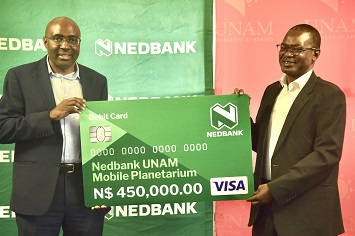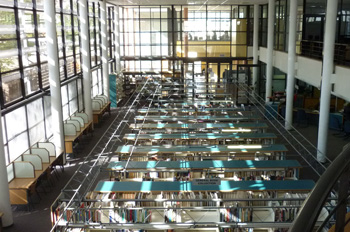
Nedbank boosts scientific education with donation to UNAM / AMT Mobile Planetarium

To address educational gaps locally, particularly in the realms of science, technology, engineering, and mathematics (STEM), Nedbank Namibia last week made a significant donation of N$450,000 to the University of Namibia (UNAM) / AMT Mobile Planetarium.
The objective of this initiative is to improve the accessibility and quality of science education, especially in remote regions where such resources are limited. Over the next three years, the donation will be allocated at a rate of N$150,000 per annum.
The UNAM / AMT Mobile Planetarium is an inflatable, interactive facility created to bring the marvels of the cosmos directly to students throughout Namibia.
This endeavor responds to a critical need within Namibia’s educational landscape, aiming to offer practical astronomical education and ignite interest in astrophysics among young minds. The mobile facility will offer diverse programs catering to various educational levels, from fundamental stargazing to delving into intricate phenomena like black holes and distant galaxies. These programmes will engage students directly, providing them the opportunity to learn from and collaborate with expert astronomers.
Martha Murorua, Managing Director of Nedbank Namibia, underscored the strategic significance of this investment, stating, ‘Our support aligns with our commitment to creating societal value by endorsing community development initiatives and improving access to STEM educational opportunities. It embodies our belief in the transformative influence of education and the empowerment of our youth as they will be the vanguards of progress.”
The efficacy of the planetarium became evident during its pilot phase. In 2019, technical partners—the Africa Millimetre Telescope program, Radboud University, and the Netherlands Research School for Astronomy—trained experts in Namibia who visited numerous schools in remote areas like Erongo and Nkurenkuru.
During these visits, over 1,500 children were introduced to the planetarium concept within days. In May 2022, the first two Namibian planetarium operators, Lott Frans, and Hiiko Katjaita, received training to conduct shows and train others. Since then, the planetarium has visited over fifty different locations, reaching more than eight thousand two hundred attendees.
Future objectives for the planetarium project include developing interactive resources for educators to complement the shows and collaborating with the National Institute for Educational Development (NIED) to enhance astronomy’s presence and integration within Namibia’s educational curriculum.
The envisioned impact of this project surpasses immediate educational outcomes. By fostering increased interest in STEM, particularly in astrophysics, the planetarium has the potential to cultivate a generation of professionals well-equipped for future job demands. These roles, often intricate and high-skilled, could enhance the earning potential of these budding scientists and significantly contribute to Namibia’s economic growth.
 Executive for Corporate and Investment Banking, Tjivingurura Mbuende, with UNAM Chief Librarian, Joseph Ndinoshiho.
Executive for Corporate and Investment Banking, Tjivingurura Mbuende, with UNAM Chief Librarian, Joseph Ndinoshiho.













































